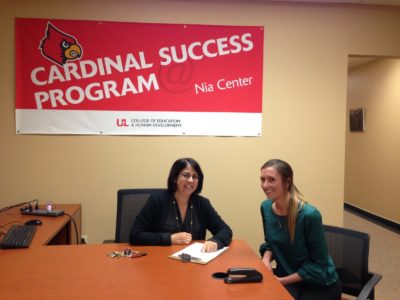Counseling Psychology Principles Engaged: Louisville’s Cardinal Success Program
Counseling psychologists often distinguish themselves from other subdivisions of psychology by emphasizing a commitment to strengths-based, culturally responsive therapeutic practice, though these ideals are difficult to weave into training programs and emerging clinical identities from a typical classroom setting. The faculty and students at the University of Louisville’s Counseling Psychology Program immerse themselves in these values through their work and training at the Cardinal Success Program. The Cardinal Success Program (CSP) is a partnership between the University of Louisvlle’s Department of Counseling and Human Development and the community of west Louisville. Currently, the CSP has two locations in west Louisville – the CSP @ NIA, a community based clinic, and the CSP @ Shawnee, a school-based clinic. The CSP provides individual, group, and family counseling, as well as psychological assessment, prevention, and support programs tailored to the community’s needs. The community partnership emphasis of CSP also guarantees that the counseling psychology trainees assigned to either CSP site walk away with a more nuanced understanding about how counseling psychology operates within a complex system and how to more deeply consider intersectionality within therapeutic relationships. Dr. Katy Hopkins, Assistant Clinical Professor and Director of the Cardinal Success Program, explains that CSP works with residents and community leaders in west Louisville to identify which behavioral health services are needed. “Community violence prevention and intervention, as well as parent and family support programs designed to strength families and the greater Louisville community are a central focus of CSP.” Bridget Cauley, a fourth-year Counseling Psychology doctoral student echoed sentiments about the importance of systems, “It was important to me that my training at CSP included a focus on understanding and considering the role of cultural, systemic, and developmental factors,” further noting that such issues are consistently addressed in individual and group supervision. “[Counseling Psychologists] are dedicated to diversity and social justice. What drew me was not only doing theory-building and research, but actually applying these ideas clinically and wrestle with what it means to actually partner with a community to create such clinics,” explains Dr. Lali McCubbin, Associate Professor and Director of Clinical Training. McCubbin noted that she came to the University of Louisville in large part due to the CSP and its opportunities for community partnership and training for students. McCubbin has worked to bring community members into her classrooms (which are held at CSP locations) to share their knowledge with students, which is an action that “ensures we don’t create a colonizer’s gaze” toward the community and “goes beyond social justice and advocacy as a social media presence or rally, but invites students to become collaborative actors within the community.” McCubbin is referencing a common pitfall of social justice work and community partnerships: the tendency to assume psychologists have the power rather than the community. Moreover, many Louisvillians see west Louisville as a sort of caricature of crime and poverty. West Louisville’s oversimplified, negative reputation reflects a real problem that Counseling Psychologists need to face: ensuring that our clients and community members living in economically-distressed neighborhoods are not seen as monolithic entities (e.g., “crime-ridden” and “in need of help”), but rather individuals and systems with both needs and strengths. Caroline Pittard, a fifth-year Counseling Psychology doctoral student, described how her view of community engagement has evolved as a result of working with teens at CSP @ Shawnee, “community engagement is a connection with a community rooted in shared goals. It aligns with counseling psychology’s emphasis on social justice and on doing with others, instead of for others.” Cauley agreed, noting that her work as the graduate assistant at CSP @ NIA gave her additional opportunities to work with community partners and hear the stories of west Louisville community members. The CSP plays a tremendous role in emphasizing cultural responsiveness among its trainees, particularly around issues of social class and intersectionality. “[Counseling psychology does] a wonderful job on LGBTQ, gender, and race/ethnicity issues, but the piece that CSP’s training emphasizes further is socioeconomic status and class,” McCubbin noted that such exploration with her trainees has stressed the need for more theoretical and empirically-based models around addressing class and psychotherapy. Pittard and Cauley echoed these sentiments, noting meeting clients in their own neighborhood setting, rather than expecting the clients to travel to them or an in-house clinic at the university, forced them to think critically about how their identities affected therapy. A consistent theme throughout all CSP interviews was a commitment to consistent growth, acknowledging that this required ongoing introspection, and a recognition of the need to meet community members and clients where they are. The development of the CSP itself reflects perhaps an additional layer of growth: to not rush things. Faculty and students began planning for the CSP years before the program found doors, opened them, or invited community members to step through them. This patience can run contrary to expectations for demonstrable change or productivity in university and graduate programs. Louisville’s commitment to doing it right – asking community members what they needed and wanted and waiting for a location in the neighborhood itself – is a systems-level exemplar of getting it right when it comes to meeting people and communities where they are. This SCP Spotlight was composed by:
Stephanie Winkeljohn Black, Ph.D., Assistant Professor of Psychology Penn State Harrisburg Tags: Community Partnership, Diversity and Social Justice, Practice, Training and Supervision |



